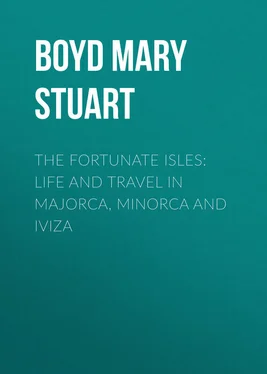Mary Boyd - The Fortunate Isles - Life and Travel in Majorca, Minorca and Iviza
Здесь есть возможность читать онлайн «Mary Boyd - The Fortunate Isles - Life and Travel in Majorca, Minorca and Iviza» — ознакомительный отрывок электронной книги совершенно бесплатно, а после прочтения отрывка купить полную версию. В некоторых случаях можно слушать аудио, скачать через торрент в формате fb2 и присутствует краткое содержание. ISBN: , Жанр: foreign_language, foreign_antique, foreign_prose, Путешествия и география, на английском языке. Описание произведения, (предисловие) а так же отзывы посетителей доступны на портале библиотеки ЛибКат.
- Название:The Fortunate Isles: Life and Travel in Majorca, Minorca and Iviza
- Автор:
- Жанр:
- Год:неизвестен
- ISBN:http://www.gutenberg.org/ebooks/39199
- Рейтинг книги:5 / 5. Голосов: 1
-
Избранное:Добавить в избранное
- Отзывы:
-
Ваша оценка:
- 100
- 1
- 2
- 3
- 4
- 5
The Fortunate Isles: Life and Travel in Majorca, Minorca and Iviza: краткое содержание, описание и аннотация
Предлагаем к чтению аннотацию, описание, краткое содержание или предисловие (зависит от того, что написал сам автор книги «The Fortunate Isles: Life and Travel in Majorca, Minorca and Iviza»). Если вы не нашли необходимую информацию о книге — напишите в комментариях, мы постараемся отыскать её.
The Fortunate Isles: Life and Travel in Majorca, Minorca and Iviza — читать онлайн ознакомительный отрывок
Ниже представлен текст книги, разбитый по страницам. Система сохранения места последней прочитанной страницы, позволяет с удобством читать онлайн бесплатно книгу «The Fortunate Isles: Life and Travel in Majorca, Minorca and Iviza», без необходимости каждый раз заново искать на чём Вы остановились. Поставьте закладку, и сможете в любой момент перейти на страницу, на которой закончили чтение.
Интервал:
Закладка:
The Fortunate Isles: Life and Travel in Majorca, Minorca and Iviza
FOREWARNING
"I hear you think of spending the winter in the Balearic Islands?" said the only Briton we met who had been there. "Well, I warn you, you won't enjoy them. They are quite out of the world. There are no tourists. Not a soul understands a word of English, and there's nothing whatever to do. If you take my advice you won't go."
So we went. And what follows is a faithful account of what befell us in these fortunate isles.
M. S. B.I
SOUTHWARDS
We had left London on a tempestuous mid-October Saturday morning, and Sunday night found us walking on the Rambla at Barcelona, a purple velvet star-spangled sky overhead, and crowds of gay promenaders all about us.
When the Boy and I had planned our journey to the Balearic Isles (the Man never plans), our imaginings always began as we embarked at Barcelona harbour on the Majorcan steamer that was to carry us to the islands of our desire. So when we had strolled to where the Rambla ends amid the palm-trees of the port, it seemed like the materializing of a dream to see the steamer Balear lying there, right under the great column of Columbus, with her bow pointing seawards, as though waiting for us to step on board.
When at sunset next day the hotel omnibus deposited us at the port, the Balear appeared to be the centre of attraction. It still lacked half an hour of sailing time, yet her decks, which were ablaze with electric light, were covered with people. Ingress was a matter of so much difficulty that our inexperience of the ways of Spanish ports anticipated an uncomfortably crowded passage.
There was scarcely room on board to move, yet up the species of hen-ladder that acted as gangway people were still streaming – ladies in mantillas, ladies with fans, ladies with babies, and men of every age, the men all smoking cigarettes.
Fortunately a recognized etiquette made those whose visits to the ship were of a purely complimentary nature confine themselves to the deck. When we descended to inspect our sleeping accommodation it was to find an individual cabin reserved for each of us; and to learn that, in spite of the mob on board, there were but four other saloon passengers. These, as we afterwards discovered, were a French honeymoon couple and a young Majorcan lady who was accompanied by her dueña .
Rain had been predicted, and was eagerly looked for, as none had fallen for many weeks. Yet it was a perfect evening. There was hardly a ripple on the water, and the air was soft and balmy. Behind the brilliant city with its myriads of lights rose the dark Catalonian mountains. Clustered near us in the harbour the crews of the fishing boats made wonderfully picturesque groups as they supped by the light of hanging lamps. And over all, high above the tall palms of the Paseo de Colon, the statue of Columbus pointed ever westwards.
Looking at the sparkling scene, it was difficult to credit that Barcelona, with its surface aspect of light-hearted gaiety, was under martial law, even though we had seen that alert-eyed armed soldiers guarded every street and alley, and knew that but a day or two earlier bombs had exploded with deadly effect where the crowds were now promenading. It was hard, too, to believe that at that moment the interest of all Europe was centred upon that sombre fortress to the south-west of the town, within whose walls, only five days earlier, Ferrer had, rightly or wrongly, met the death of a traitor.
The warning siren sounded. The visitors reluctantly scuttled down the ridiculous hen-ladder. The moorings were cast away, the screw revolved, and we were off – bound for the Fortunate Isles.
Out of many wondrous nights passed on strange waters I remember none more beautiful. We were almost alone on deck. So far as solitude went the Balear might have been chartered for our exclusive use. The second-cabin passengers had all disappeared forward. The French bride and bridegroom had found a secluded nook in which to coo; and the vigilant dueña had led her charge into retirement.
We three sat late into the night watching the lights of the beautiful city of unrest fade away into the distance, while over the sinister fortress of Montjuich the golden sickle of the new moon hung like a note of interrogation.
The Spanish coast had vanished. The ship's bow was pointing towards Africa, and wild-fire was flashing about the horizon when at last we descended to our cabins. The lightning was still flashing, but it was far in our wake, when we awoke about four in the morning to find the Balear sailing along on an even keel, close by a mountainous coast whose highest promontory was crowned by a lighthouse.
Having dressed and refreshed ourselves with biscuits, and chocolate made over a spirit-lamp, we went on deck while it was yet dark, and watched the land gradually become more and more distinct with the broadening dawn. The Boy, who had early recognised something British in the build of our steamer, made the interesting discovery from the unobliterated lettering on her bell that, though now known as the Balear , the vessel had begun her career as the Princess Maud , one of a line of steamers coasting between Glasgow and Liverpool.
As the steamer skirted the picturesque coast we tried, not very effectively, it must be admitted, to pick out the bays and headlands history connects with Jaime, the valorous young King of Aragon, who, accompanied by a great fleet, set sail from Barcelona one September day early in the thirteenth century, determined to wrest Majorca from the tyranny of the Moors, who for hundreds of years had dominated it. But when we had decided that it must have been round that point that his ships, with all lights extinguished, had crept at midnight to anchor in this bay, the appearance of yet another point and another bay made us waver. Still, there could be no mistaking Porto Pi, with its beacon tower on the point where the Moors, warned of the approach of the enemy, gathered in force to resist his landing.
The sun was illumining the wooded slopes about the ancient castle of Bellver, and shining radiantly upon Palma, lighting up the spires of the noble Cathedral and the encompassing city walls, and shining upon the mountains beyond, as about half-past six we entered the harbour, to find the wharf already busy with people.
We had left grey gloom in London and in Paris. Here all was vivid and sparkling. The air was exhilarating, the port, with its nondescript craft, was a feast of colour. Voices speaking the island tongue sounded strangely in our unaccustomed ears. Our first impression of Palma was one of brightness: an impression conveyed partly by the warm amber and golden tints of the stone of which the charming city is built.
On the previous night we had thought the Balear half empty; but with the morning many unguessed passengers made their appearance forward. The guardia civil , who was travelling with his little boy, producing a pocket-handkerchief, dipped it in a bucket of water and scrubbed his son's face till it shone, the child keeping up an excited chatter the while.
The honeymoon couple were early on deck looking out for the Grand Hotel omnibus. But we were nearly alongside the wharf before the young Majorcan lady, closely shadowed by her dueña , left her cabin.
After the manner of Spanish aristocrats when travelling, she was dressed in black, and carried a fan that seemed to go oddly with her smart hat. She had a beautiful figure, and the graceful carriage of her race. But an expression of discontent, as though she were already weary looking for something that might have been expected to happen but did not, lent an unbecoming droop to her well cut lips.
Читать дальшеИнтервал:
Закладка:
Похожие книги на «The Fortunate Isles: Life and Travel in Majorca, Minorca and Iviza»
Представляем Вашему вниманию похожие книги на «The Fortunate Isles: Life and Travel in Majorca, Minorca and Iviza» списком для выбора. Мы отобрали схожую по названию и смыслу литературу в надежде предоставить читателям больше вариантов отыскать новые, интересные, ещё непрочитанные произведения.
Обсуждение, отзывы о книге «The Fortunate Isles: Life and Travel in Majorca, Minorca and Iviza» и просто собственные мнения читателей. Оставьте ваши комментарии, напишите, что Вы думаете о произведении, его смысле или главных героях. Укажите что конкретно понравилось, а что нет, и почему Вы так считаете.











![John Bruce - The Lettsomian Lectures on Diseases and Disorders of the Heart and Arteries in Middle and Advanced Life [1900-1901]](/books/749387/john-bruce-the-lettsomian-lectures-on-diseases-and-disorders-of-the-heart-and-arteries-in-middle-and-advanced-life-1900-1901-thumb.webp)
